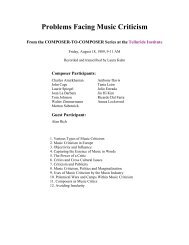Sixth World Symposium on Choral Music ... - NewMusicBox
Sixth World Symposium on Choral Music ... - NewMusicBox
Sixth World Symposium on Choral Music ... - NewMusicBox
Create successful ePaper yourself
Turn your PDF publications into a flip-book with our unique Google optimized e-Paper software.
New<strong>Music</strong>Box May 2003<br />
7. Spiritual C<strong>on</strong>necti<strong>on</strong>s<br />
LINDA HOESCHLER: Libby, I am curious, did you tend to incorporate Eastern elements in<br />
your music or did you stick more to the Western idiom?<br />
LIBBY LARSEN: I stuck to Western notati<strong>on</strong>, and I used <strong>on</strong>ly a little glissando here and there,<br />
because I love koto and so I thought I would try to h<strong>on</strong>or the koto by putting tiny glissandos<br />
here and there in the piece. Believe it or not, I used 6/8 as my meter and spent the entire piece<br />
trying to negate the bar line, which is what I often do. If the world were mine as a composer, I<br />
would have no bar lines, ever. If I could write my own, a workable score, it would be a bar<br />
lineless score with a suggesti<strong>on</strong> of a meter, and then I would hand out acetates to the choir to<br />
overlay bar lines as needed, just to learn the piece, but then take them away. But of course, I<br />
grew up singing Gregorian chant.<br />
LINDA HOESCHLER: Moses, any comments when you hear about Libby? You both have very<br />
spiritual roots in your music.<br />
MOSES HOGAN: Very interesting what she has said, and I am glad to know that you might get<br />
a little writer's block every now and then. People often ask, "Mr. Hogan, what is your<br />
motivati<strong>on</strong>?" And I acknowledge a God-given talent, and then I say, "But a deadline is right up<br />
there!" It is interesting. One of the things that you said about the text…We had a little sessi<strong>on</strong><br />
yesterday as I of course did have a chance to work with the kids. And so it is important—and I<br />
said to them—to have really a group discussi<strong>on</strong> about the text that you're singing. You know, my<br />
singers sing because we have a commitment to preserve something that is uniquely important. I<br />
feel a sense, a resp<strong>on</strong>sibility, to carry <strong>on</strong> the w<strong>on</strong>derful missi<strong>on</strong> of the unknown bards who<br />
created the spiritual, whom we are not privy to know their names. And I enjoy a success and<br />
having my name published <strong>on</strong> various arrangements, but we are not privy to know the names of<br />
the individuals who created the text for "Swing Low, Sweet Chariot." And so, the singers whom I<br />
surround myself with also feel the sense of resp<strong>on</strong>sibility and a sense of pride to keep their<br />
message of hope alive. With young people it is important, I have found, that in singing a s<strong>on</strong>g in a<br />
foreign language, or if you are doing <strong>on</strong>e of these spirituals, to talk about what this text means to<br />
you. We had a little sessi<strong>on</strong> yesterday, and I said, "I want to hear from you what you feel, what<br />
you have received from the text of this s<strong>on</strong>g. What do you feel is the message? There is no wr<strong>on</strong>g<br />
answer or right answer.” Many times, kids look to us to tell them the answer, and then they<br />
resp<strong>on</strong>d, "Yes, that's what I feel," but that's not always the case. You have to have an open<br />
sessi<strong>on</strong> I believe, to find out what the s<strong>on</strong>g means to you. And so <strong>on</strong>ce that took place I was able<br />
to find out what they actually felt about the text that I had written, and then <strong>on</strong> many, many,<br />
many views. But <strong>on</strong>ce you do that, you open the door to have them deliver this s<strong>on</strong>g, and that's<br />
the most important thing because I reminded them, that the singer sings the message. The public<br />
speaker speaks the message. So we have a resp<strong>on</strong>sibility—if it is in a foreign language, you've got<br />
to know what it is that you're singing about. I heard a choir sing a compositi<strong>on</strong> in a foreign<br />
language and <strong>on</strong>ly learned it from the ph<strong>on</strong>etic side. Not a clue about what they were singing<br />
about. So there was no passi<strong>on</strong>; there was no facial expressi<strong>on</strong>. Sadly, that's not music. And so,<br />
Composers’ Dialogue #1, 08/06/2002





